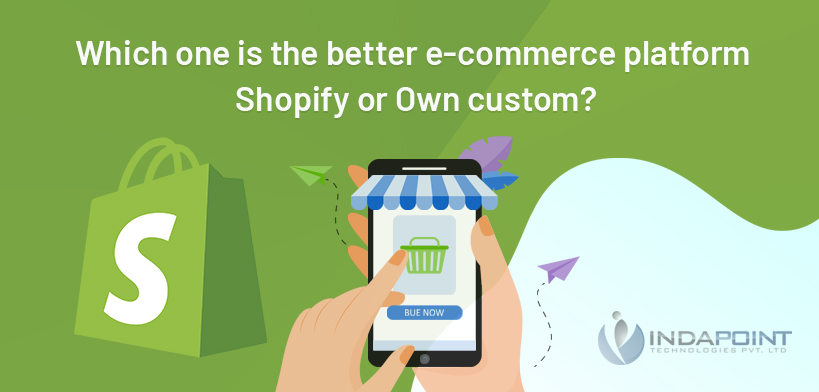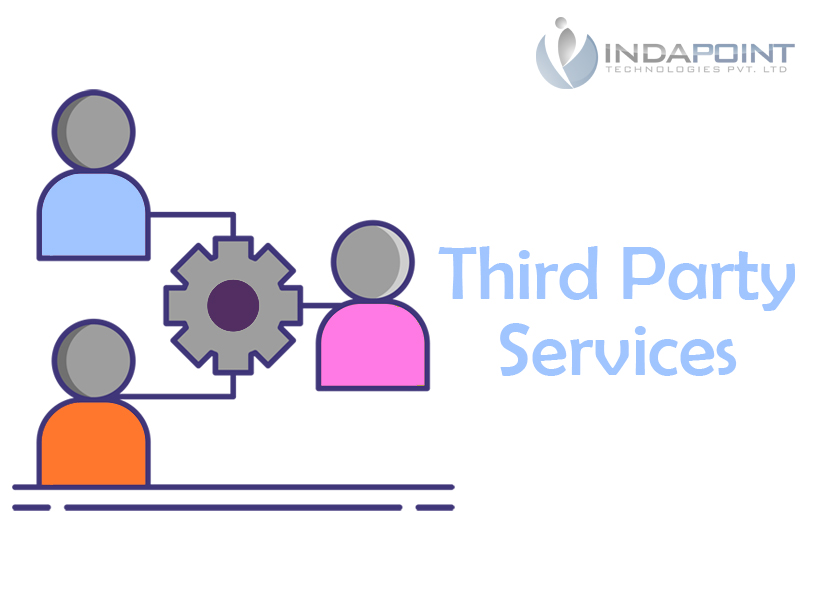Which one is the better ecommerce platform Shopify or Own custom?
May 27, 2021

If you haven’t yet entered the eCommerce arena and wondered if Shopify vs. own website is better, 2021 may be the year to start thinking about starting an online company. The COVID pandemic has wreaked havoc on many sectors, but eCommerce is capitalizing on the situation. There’s also evidence: in the United States and Canada, the number of online retail orders has increased by nearly 150 percent. In the year 2020, e-commerce stores can be found on any (virtual) corner. And, as the number of e-commerce companies grows, so does the number of template websites like Shopify.
You’ve already heard of Shopify vs. own website if you have an e-commerce company or are considering starting one. It’s one of the most popular e-commerce template sites on the internet. It’s also a good choice for an e-commerce store if you want to get your store up and running quickly or don’t need a lot of customization.
A built-for-you custom commerce solution is an excellent choice if your store has unique needs or you want a platform that can expand with your business as it grows.
So the question remains: Which option is best for an eCommerce store, Shopify vs. your website?
We understand how complex this issue can be for Shopify vs. your website (and probably why you ended up here on our blog post). But don’t worry; we’ve compiled some helpful information to assist you in determining if an off-the-shelf website or a customized solution is better for you and your business.
After all, our mission is to help you and your company succeed. So, take a look at our e-commerce website design and development page, or keep reading to find out which option is better for your e-commerce requirements.
What is an e-commerce website?
Customers can search and purchase your goods online using an e-commerce website. A payment gateway, order fulfillment services, and a list of your goods and services will all be available on the website. Shopify’s popularity among online businesses stems from the fact that it needs no coding experience and allows you to create an e-commerce website in minutes.
Now
“Well, okay… how do I choose – Shopify vs. own website?” you may wonder. ”
When it comes to Shopify vs. your website, there have been numerous debates about using Shopify or creating one’s website. Both have advantages and disadvantages and a number of factors to consider before making a final decision.
So, we’ll use this article to help you figure out which solution is best for you when running your online store e-commerce platforms vs the website.
An Overview of Shopify vs. Custom Built Websites
To begin, we’ll provide simple definitions of website builders, such as Shopify vs. Custom-built Websites or any eCommerce Platform Shopify:
An eCommerce Platform Shopify is an online store that allows anybody to open an online store and sell their goods. Shopify has grown to become the best eCommerce platform open source for businesses of all sizes in the last ten years. Shopify, which was established in 2004, now has over 800,000 stores in nearly 175 countries. As a result, it is the most standard shopping cart app.
A team will be behind the company’s custom-built website. It all begins with a brainstorming session to learn more about the target market, marketing campaign, website functionality and design. To entirely run your website, you’ll also need to find your hosting service or other third-party extensions.
Custom-built websites, as a result, take longer to develop than other eCommerce platforms.
Shopify vs. your own website Comparison
Let see the comparison of Shopify vs. your own website e-commerce development.
The simplicity of getting started
For almost everyone, starting with a custom Shopify store is less painful than starting from yourself. The following are some of the reasons for this:
Availability of domains and hosting – Shopify eliminates the need for merchants to purchase a new domain or find a hosting provider. You can choose between a free.myshopify.com domain and a custom domain. It’s entirely up to you.
You’ll need a web developer and hosting and domain providers like Bluehost or GoDaddy if you want to build your store with a self-hosted option.
With Shopify, no coding skills required: merchants can effortlessly build their business from the ground up without any coding experience. It has back-end capabilities that allow you to build your store step-by-step.
On the other hand, having a personalized website necessitates a certain level of technical expertise (if not, you need a skillful development team or to hire a developer that can help with the website setup).
Shopify’s CMS (Content Management System) – Shopify is the best eCommerce Platform open-source allows merchants to modify the design of their store at any time, thanks to pre-built eCommerce templates. It also has a dedicated analytics dashboard that displays data that can be used to inform future marketing efforts. Shopify is the best online store builder.
When creating your website, you should think about using a content management system (CMS) to manage your blog and website. In addition, you may need to install a plugin with eCommerce capability to design your online store. For instance, a vendor who uses WordPress to build their site might use WooCommerce (a WordPress plugin) to gain the full eCommerce functionality.
How long does it take to set up an online store?
Shopify is the clear winner this time when it comes to saving time; it is the best online store builder. Merchants may easily set up their Shopify stores in just a few steps. Shopify also offers a 14-day free trial so that users may experiment with the platform and gain an explicit knowledge of it before committing.
Before you can start selling on your own website, you’ll need to spend some time getting things in order. You’ll need to spend time looking for a suitable domain and hosting provider, calculating web development charges, and contemplating SSL installation. Because even a minor blunder can result in your website collapsing, the process can be complex at the beginning.
Theme and Web design

On the Shopify Theme Store, merchants may choose from a wide range of themes to fit the look and feel of their desired online presence. Shopify themes are, unsurprisingly, designed specifically for e-commerce. The whole range of responsive, speed-optimizing, and mobile-friendly web layouts is available to sellers.
If you decide to build your store, though, you’ll have to put in more time and effort to pick the best theme. When doing your study, make sure it has good ratings and active consumers and store design flexibility to adapt to your audience’s values.
If you don’t have a web designer, there are many large theme marketplaces, such as Themeforest or MOJO, where you can get tonnes of responsive themes at lower costs than the Shopify Theme Store.
The benefit of having a custom Shopify store is that you may customize it as much as you want. It’s incredibly adaptable, and you may customize it to increase sales and revenue.
In the long run, if you want an advanced change using Shopify, you’ll need to experiment with the liquid code to achieve your preferred online design.
Functionality and options

Because Shopify is a one-of-a-kind eCommerce platform, it offers a wide range of capabilities to sellers. Here are a few of the most notable:
Fraud analysis: Because Shopify can gather proof for any disputed charges, this aids in detecting fraudulent orders and reducing chargebacks.
Payment providers: With Shopify, you can use the PCI (Payment Card Industry) certified Shopify Payments tool (which accepts Visa, Mastercard, Apple Pay, and other payment methods). You can also use other payment providers, but you will be charged transaction costs.
You can find these plugins in the Shopify App Store if you want to add extra features or integrate external services to your Shopify store. For example, if you want to construct a fully personalized Shopify.
You must consider having dependable payment gateways and choosing extensions that meet the best of your eCommerce demands when building your own website, in addition to finding a competent platform and software to develop the store.
Another example is that if a seller uses WordPress to create their website, they may need to install additional WooCommerce plugins to provide eCommerce capabilities.
Third-party services

As previously mentioned, the eCommerce platform Shopify supports a large variety of third-party apps that help with marketing, SEO, inventory management, and much more.
Shopify is regarded as an “all-in-one package” that may provide sellers with a wide range of eCommerce options. If you want to expand your reach, the platform allows you to integrate sales channels (like Amazon or Facebook). Even better, Shopify POS will enable companies to sell both online and in person.
Shopify Experts can assist retailers with everything from marketing to store setup.
The story is different from your personalized website. When it comes to discovering the best eCommerce plugins/extensions for your online store, the process necessitates a significant amount of time and money spent on research.
Updates and Maintenance

Growing your company requires perseverance, as well as ongoing upkeep and upgrades.
Everything is at your fingertips with Shopify. Merchants’ storefronts will be updated to the current version automatically and will work seamlessly with any software.
Sellers who have a custom-built store must update their website manually and frequently. Also, if you don’t have a lot of technical understanding, having or hiring a development team is the best way to go.
You may have to pay a monthly eCommerce maintenance plan price for those services due to the requirements of consistent site maintenance.
Shopify is once again the champion when it comes to security. It gives you and your customers an SSL certificate that protects both of you. On the other hand, you’ll have to pay a specific amount of money to set up your website, and the procedure can be frustrating when unidentified issues develop.
Customer Support

Shopify provides live chat, phone, and email support 24 hours a day, seven days a week. If merchants require additional assistance or information, they can search the Shopify Help Center’s online database.
You can go to the Shopify Academy, Shopify Blog, or start a discussion in the Shopify Community for informational materials on how to grow your store.
Meanwhile, you can get learning resources for your website from Google, YouTube, forums, videos, blogs, or tweets, among other places. The number of resources is limitless, but the lack of a centralized source means it will take a long time to find what you need.
If you utilize WooCommerce as an e-commerce platform, they solely provide help in tutorial documents. A disadvantage of this platform is that it currently does not give support through channels such as direct email, phone, or social media.
Pricing

In terms of monthly subscriptions, Shopify provides three options. Each plan comes with a long list of benefits. The programs are Basic Shopify, Shopify, and Advanced Shopify.
Basic Shopify 29$, Shopify 79$, Advanced Shopify 299$. You’ll have to factor in the cost of operating third-party apps on your store, as well as one-time-purchase themes and your annual domain registration, in addition to the primary plan.
Almost every feature on a bespoke website must be paid for separately. Domains, web hosting, SSL certificates, custom site design, eCommerce plugins, email marketing, payment processing software, and so on are all included.
Other unanticipated charges will develop during the operation and upkeep of your store in the long run. A little simple math demonstrates that Shopify is the better option other than custom e-commerce website cost when it comes to funding.
Shopify vs. Custom Website: Which one is best?
If you’re new to the eCommerce business and want an easy way to get your online store up and running quickly, custom ecommerce solutions Shopify is the way to go.
On the other hand, a custom-built store is a terrific choice if you’re an ambitious merchant searching for long-term originality and customization freedom. However, keep in mind that you’ll need to choose a platform to assist you with your eCommerce goals.
Regardless of how much we debate Shopify vs. your website, only you can decide which is best for you. Why not take advantage of Shopify’s 14-day free trial to get a feel for the platform and create a demo store?IndaPoint Technologies is the best Shopify development company with more than 15 years of experience serving Shopify development services. To ensure that your customers are satisfied with mobile apps that we have produced, we focus on security, efficiency, and a stunning UI design for your application.
We use high-quality criteria and techniques for app testing to deliver on our promises, and our cms development services are reasonably priced. We continue to focus on the latest technology to ensure that we can provide Shopify development at its best. We also offer Magento development solutions, and if you are interested, you can hire Magento developers from IndaPoint Technologies.
If you are also interested in creating a Shopify website, we are here to assist you with our highly qualified and skilled staff. Contact us.




